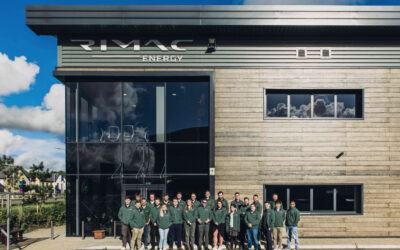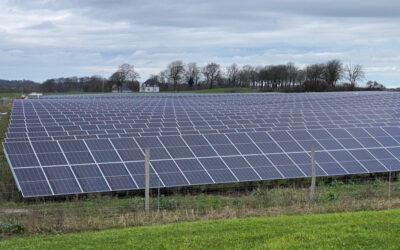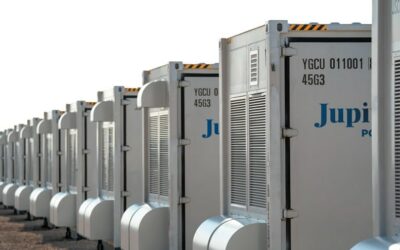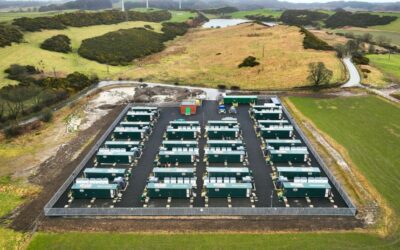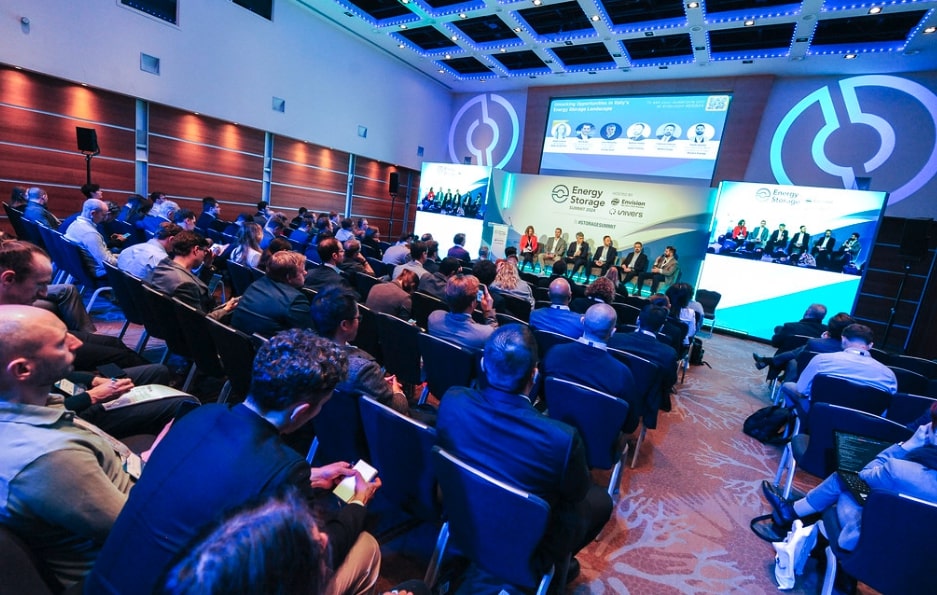
Italy’s grid-scale energy storage market opportunities are unlike anywhere else, but many challenges and uncertainties around the different revenue streams remain, including the upcoming MACSE capacity market auction.
That was the message from the ‘Unlocking Opportunities in Italy’s Energy Storage Landscape’ panel discussion on Day 1 of last week’s Energy Storage Summit EU in London, hosted by our publisher Solar Media.
Enjoy 12 months of exclusive analysis
- Regular insight and analysis of the industry’s biggest developments
- In-depth interviews with the industry’s leading figures
- Annual digital subscription to the PV Tech Power journal
- Discounts on Solar Media’s portfolio of events, in-person and virtual
Or continue reading this article for free
Speaking to a packed audience hall, executives from technology providers Energy Dome, Energy Vault and NHOA Energy and developers Sphera Energy and Renera Energy discussed one of Europe’s most exciting upcoming grid-scale markets. Alongside the MACSE auction, they touched on grid, project development and opportunities for software and optimisation providers.
Italy is a ‘fundamentally strong market’ for storage
Mahael Fedele, Partner, CEO of Sphera Energy, said that Italy has several unique characteristics that make it an exciting market for large-scale storage.
“The country obviously needs energy storage. You have centres of renewable generation and centres of consumption which are far apart. There’s a lack of grid interconnection with other countries. And there is a big buildout of renewables. The three combine to create a fundamentally strong market,” he said.
“There is also a clear regulatory push with an ambitious plan for energy storage deployments, which is huge compared to other markets in Europe. Italy is also fundamentally open to foreign investment compared to some other countries.”
MACSE auction for storage ‘unlike anything seen elsewhere’, big implications for project financing
Part of that regulatory push and a huge talking point of the panel was transmission system operator (TSO) Terna’s capacity market auction for energy storage, called MACSE (Electric Storage Capacity Procurement Mechanism).
The scheme will award long-term contracts to energy storage projects to make their capacity available to third-party market operators on the Dispatching Services Market (MSD), in exchange receiving annual premiums to cover operating costs for which €17.7 billion (US$19.15 billion) in state aid was approved by the EU late last year. It is aimed at helping fund the deployment of the 8GW/71GWh of new storage that Terna estimates the country needs by 2030.
The long-term contracts – 12-14 years – will be interesting from a project financing perspective, said Luca Manzella, VP Sales EMEA for Energy Vault, a company known for its gravity-based energy storage solution which has also moved into short-duration BESS and green hydrogen. “It will also be interesting for long-duration energy storage (LDES) considering the target duration is eight hours,” he added.
Fabrizio Ciaccia, VP EMEA for EV and BESS solution firm NHOA Energy, agreed: “This contracted model represents an opportunity from a project financing perspective to see something which hasn’t really been done in the energy storage market yet. Projects to date have all been by utilities, and now the market is opening up to IPPs and funds.”
Paolo Sereni, COO and head of storage for developer Renera Energy, also agreed, pointing out that the Italian market has not seen any bank financing for energy storage, yet. “It will be interesting to see how the banks’ experience in wind and solar translates into storage.”
Technological aspects of the auction
With three different technology providers on the panel, it made sense to unpick the topic of technologies for the auction too. The MACSE auction has stipulated that 90% of the funding will go to either lithium-ion battery energy storage system (BESS) or pumped hydro energy storage (PHES), with 10% allocated for ‘other technologies’.
Ben Potter, COO for ‘CO2 battery’ company Energy Dome, said he was confident that other technologies would be needed for Italy to hit the 71GWh figure, and said its technology would be able to bid in to the auction at a lower price than lithium-ion BESS or PHES.
But, Manzella said it was still quite unclear what the benchmark for the 10% of ‘other technology’ would be. “There are a lot of open points that need to be addressed.”
Sereni made a similar point on the auction more generally: “Some technical specifications for the MACSE auction still need to come out. We don’t know if there will be a premium for power over duration. Developing optionality in projects is, therefore, key and not many have thought about this. “
Building on this, Manzella said: “Early discussions with the system integrators will be needed (because of the uncertainty). The final solution could end up being very different from the first plan, based on duration and different charging and discharging regimes.”
Sereni also said that new LDES assets would struggle to compete with PHES in the North of Italy (where the mountainous landscape allows for PHES), although Potter pointed out that PHES is “difficult and very risky to do”.
Auction’s capex assumptions ‘a bit low’
In response to an audience question around what price the panel expected the MACSE auction – which should take place in Q2 or Q3 this year – to clear at, no one gave a figure, but all agreed the capex assumptions for lithium-ion in the preliminary documentation were on the low side.
Note that energy storage’s surprise big wins in the conventional capacity market for 2024 delivery, which was run in early 2022, were the result of years of capex reductions. Utility Enel is building most of those systems to come online this year.
North-South development dichotomy and other revenue streams
An audience member asked why there was so much more project development activity in the North of Italy when the MACSE auction is more targeted at the South, where the renewable generation centres will be.
“We have the same question,” Sereni responded. “Many started developing storage trying to get to ready-to-build (RTB) quickly and developing is a bit easier in the North of Italy. Terna then came out and said the South is the clear need. There will definitely be a role for energy storage in the North but not MACSE.”
Those other revenues would be around ancillary services, and could also include Terna’s new renewable load-shifting power pool, where storage operators will sell time-shifting of renewables to renewable operators in a centralised market.
Grid challenge different to other countries
The challenge of getting projects connected to the grid in time to capture opportunities exists in every market, but it’s unique in Italy, as Fedele explained.
“Grid is important too. It’s relatively easy to apply, and you get a grid connection offer, and they all generally look pretty good. What is very implicit and complicated is that all these upgrades to the grid need to be authorised and permitted by the developers/sponsors themselves, which you could describe as a ‘pooled’ development of the grid. It’s interesting but also a bit messy.”
“If the project of the company responsible for the grid upgrade falls off, it falls to the next project developer/sponsor. It’s an iterative process which is not always very easy to understand, it’s not really clear when you’ll connect and takes a lot of understanding. The North is generally easier, but the South is a bit more congested. Grid is something you should take time to understand.”
Opportunities in Italy for optimisation and software providers
Although the long-term, predictable nature of the MACSE capacity market revenues might at first glance imply less of a role for optimisation firms – which tend to proliferate in merchant markets like the UK and Texas, US – this isn’t necessarily all true.
“There will be some exposure to merchant for MACSE projects. But even within MACSE, you are still exposed to potential balancing costs and revenues, and there could be a risk management role for optimisation software providers there,” Manzella said.
Operating in the ancillary service markets would also necessitate some third-party optimisation activity, Sereni added.

